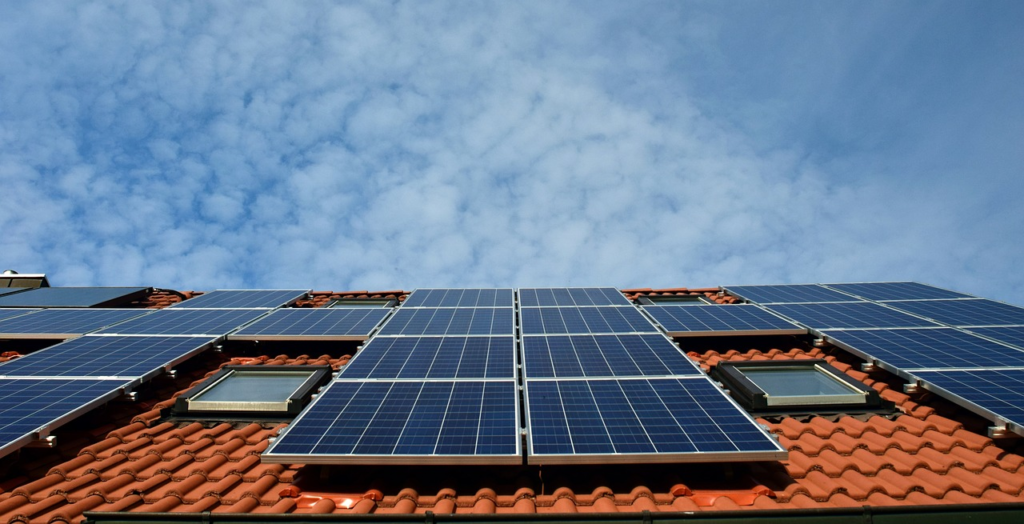
If you’ve been considering switching to solar energy but worried about the high upfront costs, there’s good news: the government offers programs that provide free solar panels to eligible homeowners. With the rising focus on renewable energy and reducing carbon emissions, government initiatives aim to make solar energy accessible to more people.
In this article, we will explore how you can take advantage of government solar panel programs to get free solar panels for your home. We will delve into the eligibility criteria, application process, and the various federal incentives and grants available to help you embark on your sustainable energy journey.
Key Takeaways:
- Government programs offer free solar panels to eligible homeowners, making solar energy more accessible.
- Understanding government solar panel programs is crucial to determine your eligibility and application process.
- Federal renewable energy incentives and grants can significantly reduce the cost of solar panel installation.
- Solar energy subsidies, such as tax credits and rebates, help offset the expenses associated with going solar.
- Specific government initiatives aim to provide free solar energy to individuals and communities, promoting sustainable energy solutions.
Understanding Government Solar Panel Programs
Government solar panel programs provide homeowners with an opportunity to access free solar panels for their homes. These programs are designed to support sustainable energy initiatives and promote the adoption of renewable energy sources.
There are various government solar panel programs available, each with its own eligibility criteria and application process. These programs aim to make solar energy more accessible and affordable for homeowners, ultimately reducing their reliance on traditional energy sources.
“Government solar panel programs play a crucial role in advancing sustainable energy solutions and reducing carbon emissions. By offering free solar panels for homes, governments incentivize homeowners to transition to clean, renewable energy sources.”
When considering applying for a government solar panel program, homeowners need to meet specific requirements. These criteria may involve factors such as income level, location, and the condition of the property. Additionally, homeowners should be prepared to provide documentation to support their application.
Understanding the application process for government solar panel programs is key to ensuring a successful application. Homeowners need to familiarize themselves with the necessary paperwork, deadlines, and any additional documentation required. It is advisable to consult with local renewable energy organizations or government agencies to gain insights and guidance throughout the application process.
Types of Government Solar Panel Programs
Government solar panel programs can vary by jurisdiction and may include different types of initiatives. Some common types of programs include:
- State-funded solar panel programs
- Local government incentives for solar panel installation
- Community solar programs
State-funded solar panel programs typically offer financial assistance or grants to homeowners who qualify. These programs may cover the cost of solar panel installation partially or in full, making it more accessible for homeowners to adopt renewable energy solutions.
Local government incentives for solar panel installation provide homeowners with additional benefits, such as reduced property taxes or expedited permit applications. These incentives aim to encourage homeowners to invest in solar panels and contribute to their communities’ overall energy sustainability.
Community solar programs allow homeowners to participate in shared solar projects. These programs provide the benefits of solar energy to homeowners who are unable to install solar panels on their own property, either due to inadequate roof space or rental agreements, for example. Participants can subscribe to a community solar project and receive credits or discounted energy rates based on their contribution.
Benefits of Government Solar Panel Programs
Government solar panel programs offer several advantages to homeowners who qualify:
- Reduced electricity bills: Installing solar panels can significantly reduce electricity bills, as the energy generated from the sun is harnessed and used to power the home.
- Environmentally-friendly energy: Solar energy is a clean, renewable energy source that helps reduce carbon emissions and dependence on fossil fuels.
- Increased property value: Homes with solar panels installed tend to have higher property values, making it a worthwhile investment for homeowners.
- Long-term savings: Once solar panels are installed, homeowners can enjoy long-term savings on electricity bills as they rely more on solar energy and less on traditional energy sources.
By participating in government solar panel programs, homeowners can take initiative in creating a greener future while also enjoying financial benefits. These programs play an essential role in promoting renewable energy adoption and sustainability.
| Table: Comparison of Government Solar Panel Programs | Eligibility Criteria | Application Process | Financial Assistance |
|---|---|---|---|
| State-funded solar panel programs | Income level, property condition, location | Submit application, provide supporting documentation | Partial or full cost coverage for solar panel installation |
| Local government incentives | Depends on local regulations and initiatives | Application process may vary by location | Additional benefits such as reduced property taxes |
| Community solar programs | No direct property-related eligibility criteria | Participation and subscription-based | Credits or discounted energy rates |
Federal Renewable Energy Incentives and Grants

When it comes to obtaining free solar panels, individuals can benefit from a range of federal renewable energy incentives and grants. These programs are designed to encourage the adoption of solar energy and reduce the financial burden of solar panel installation. By taking advantage of these government assistance programs, homeowners can make significant progress towards a more sustainable and eco-friendly future.
One of the key benefits of federal renewable energy incentives is the financial assistance they provide. Through government solar panel grants, individuals can receive funding to cover a portion or even the entire cost of installing solar panels. This financial support makes solar energy more accessible and affordable, enabling more households to harness the power of the sun and reduce their reliance on traditional energy sources.
By utilizing government-funded programs, homeowners have the opportunity to not only save money but also contribute to a cleaner environment. The federal government recognizes the urgency of addressing climate change and is committed to supporting the transition to renewable energy solutions. These incentives and grants are a testament to that commitment.
In addition to financial assistance, federal renewable energy programs also provide valuable guidance and resources to homeowners. They offer information on solar panel installation, eligibility requirements, and how to navigate the application process. This support ensures that individuals have the necessary knowledge and tools to make informed decisions about installing solar panels and maximizing the benefits of renewable energy.
State and Local-Specific Incentives
It’s important to note that renewable energy incentives can vary from state to state and even within local jurisdictions. Some states offer additional incentives on top of federal programs, further sweetening the deal for homeowners interested in solar panel installation. These state-specific programs may include tax credits, rebates, or additional grants that can significantly lower the overall cost of going solar.
It’s recommended to research and explore the specific incentives available in your state or local area. Understanding the local landscape of renewable energy assistance can help you take full advantage of the financial benefits and resources offered by both federal and state governments.
Exploring Solar Energy Subsidies

Solar energy subsidies play a crucial role in promoting the adoption of renewable energy solutions. By providing financial incentives, such as tax credits and rebates, these subsidies contribute to offsetting the cost of installing solar panels and making them more accessible to homeowners and businesses.
One common type of solar energy subsidy is the federal investment tax credit (ITC). This tax credit allows eligible individuals and businesses to deduct a percentage of the cost of their solar panel system installation from their federal taxes. Currently, the ITC offers a 26% credit for residential installations and a 22% credit for commercial installations.
In 2023, the residential ITC will decrease to 22%, while the commercial ITC will decrease to 10%. Therefore, individuals and businesses interested in solar panel installation are encouraged to take advantage of these higher credit percentages before they decrease.
In addition to the ITC, some states and local governments offer their own solar energy subsidies. These can include additional tax credits, rebates, or grants. For example, the New York State Energy Research and Development Authority (NYSERDA) offers the NY-Sun Incentive Program, which provides financial incentives to homeowners and businesses who install solar photovoltaic (PV) systems.
It is important to note that the availability and amount of solar energy subsidies may vary depending on the location and specific program requirements. Therefore, homeowners and businesses should research the subsidies available in their area and consult with local renewable energy organizations or solar panel installation companies for detailed information and guidance.
Benefits of Solar Energy Subsidies
- Reduced Cost: Solar energy subsidies help offset the upfront costs of installing solar panels, making them more affordable for homeowners and businesses.
- Financial Savings: By harnessing solar energy, individuals and businesses can significantly reduce their monthly electricity bills, leading to long-term financial savings.
- Environmental Impact: Solar panels generate clean, renewable energy, reducing reliance on fossil fuels and contributing to a more sustainable future.
- Economic Growth: The solar energy industry drives job creation and economic growth, fostering local development and technological innovation.
By exploring and taking advantage of solar energy subsidies, individuals and businesses can contribute to the transition to a more sustainable and environmentally-friendly energy system while enjoying the numerous benefits of solar power.
Government Initiatives for Free Solar Energy
As part of their commitment to sustainable energy solutions, governments around the world are implementing initiatives to provide free solar energy to individuals and communities. These programs aim to encourage the adoption of renewable energy sources and reduce carbon emissions. By offering free solar energy, governments are helping individuals save on their electricity bills and contribute to a cleaner, greener future.
One notable example of a government initiative for free solar energy is the Community Solar Program in California. This program allows residents who are unable to install solar panels on their own properties to benefit from solar energy by subscribing to a shared solar farm. By pooling resources and leveraging economies of scale, the program provides free solar energy to participants, furthering the state’s renewable energy goals.
“The Community Solar Program has been a game-changer for our community. It has allowed us to access clean, renewable energy and reduce our carbon footprint without the need for individual installations. We are proud to be part of this initiative and contribute to a sustainable future.”- Sarah Johnson, Program Participant
The Solar Homes Program in Victoria, Australia, is another government initiative that offers free solar energy to homeowners. Through this program, eligible households can receive up to a certain amount of funding for the installation of solar panels. By reducing the upfront cost, the program aims to make solar energy more accessible and encourage widespread adoption of renewable energy.
Government initiatives for free solar energy not only provide immediate benefits to individuals and communities but also contribute to long-term environmental sustainability. By leveraging the power of solar energy, governments can reduce reliance on fossil fuels, decrease greenhouse gas emissions, and pave the way for a cleaner and more sustainable future.
| Government Initiative | Location | Description |
|---|---|---|
| Community Solar Program | California, USA | A shared solar program that provides free solar energy to residents who are unable to install solar panels on their own properties. |
| Solar Homes Program | Victoria, Australia | An initiative that offers funding for the installation of solar panels in eligible households, making solar energy more accessible. |
| Renewable Energy for All | Netherlands | A government program that provides free solar energy systems to low-income households, promoting energy affordability and reduced carbon emissions. |
Maximizing Your Chance of Success
When it comes to obtaining free solar panels from the government, there are several strategies you can employ to increase your chances of success. By following these tips and guidelines, you can maximize your eligibility and improve your chances of being selected for a government solar panel program.
1. Gather Proper Documentation
One of the first steps in maximizing your chance of success is to ensure you have all the necessary documentation in order. This includes proof of residency, income statements, and any other documents required by the government program. By having these documents readily available, you can streamline the application process and demonstrate your eligibility.
2. Understand Eligibility Requirements
Each government solar panel program has specific eligibility requirements that must be met. Take the time to carefully read through the program guidelines and understand the criteria for qualification. This will help you determine if you meet the necessary requirements and avoid wasting time on programs that may not be a good fit.
3. Research Local Renewable Energy Organizations
Engaging with local renewable energy organizations can be instrumental in maximizing your chance of success. These organizations often have valuable insights and resources that can help you navigate the application process and increase your chances of being selected. They can also provide guidance on other renewable energy incentives and grants that may be available in your area.
4. Seek Professional Assistance
If you’re unsure about the application process or need additional support, consider seeking professional assistance. There are consultants and organizations that specialize in helping individuals navigate government solar panel programs. They can provide you with expert guidance, help you prepare your application, and increase your chances of success.
5. Stay Informed and Persistent
Government solar panel programs may have limited funding and strict application periods. It’s important to stay informed about program updates, deadlines, and any changes in eligibility criteria. Be persistent in your pursuit of free solar panels and actively seek out opportunities that align with your goals.
By implementing these strategies, you can maximize your chance of success in obtaining free solar panels from the government. Remember, patience and persistence are key, and with the right preparation and proactive approach, you can take advantage of these government programs to embrace renewable energy and reduce your carbon footprint.
Conclusion
Throughout this article, we have explored the various opportunities available to obtain free solar panels from the government. Government initiatives play a crucial role in promoting renewable energy adoption and providing support to homeowners seeking to harness the benefits of solar power.
By understanding the eligibility criteria and application processes of government solar panel programs, individuals can take advantage of these programs to receive free solar panels for their homes. Additionally, federal renewable energy incentives and grants offer financial assistance, reducing the cost of solar panel installation and encouraging the transition to clean energy.
Solar energy subsidies, including tax credits and rebates, further contribute to the accessibility of solar power. These incentives help offset expenses, making government-funded solar panels an attractive choice for individuals committed to sustainable living.
It is crucial to stay informed about the latest opportunities and benefits provided by government initiatives. By engaging with local renewable energy organizations and exploring different free solar energy initiatives, individuals can make significant strides toward a greener, more sustainable future.
FAQ
How can I get free solar panels from the government?
To access free solar panels from the government, individuals can apply for government solar panel programs. These programs provide financial assistance or grants to homeowners to cover the cost of solar panel installations. By meeting specific eligibility criteria and following the application process, individuals can receive free solar panels for their homes.
What are government solar panel programs?
Government solar panel programs are initiatives launched by federal, state, or local governments to promote the use of renewable energy. These programs aim to reduce the carbon footprint, increase energy efficiency, and offer financial incentives to homeowners interested in installing solar panels. By participating in these programs, homeowners can access free solar panels for their homes.
Are there renewable energy incentives and grants available?
Yes, there are renewable energy incentives and grants available from the government. These incentives and grants are designed to encourage the adoption of renewable energy solutions, such as solar panels. They provide financial assistance to cover a portion of the installation costs or reduce the overall expenses for individuals interested in utilizing solar energy.
How can I benefit from solar energy subsidies?
Solar energy subsidies, such as tax credits and rebates, can significantly reduce the cost of solar panel installation. These subsidies offset a portion of the expenses and make solar energy more affordable for homeowners. By taking advantage of these subsidies, individuals can save money and contribute to a cleaner and more sustainable future.
Are there government initiatives for free solar energy?
Yes, there are government initiatives aimed at providing free solar energy to individuals or communities. These initiatives often target specific groups, such as low-income households, and offer fully-funded solar panel installations. By participating in these initiatives, individuals can benefit from the advantages of solar energy without any upfront costs.
How can I maximize my chance of success in government solar panel programs?
To maximize your chance of success in government solar panel programs, it is essential to carefully read and understand the program requirements. Ensure that you submit all required documentation accurately and within the specified deadlines. Engaging with local renewable energy organizations can also provide valuable guidance and support throughout the application process.






